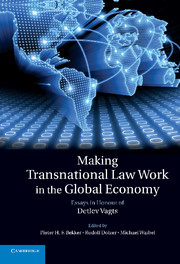Book contents
- Frontmatter
- Contents
- List of contributors
- Foreword: the transnationalism of Detlev Vagts
- List of cases cited
- List of abbreviations and acronyms
- Introduction: a Festschrift to celebrate Detlev Vagts' contributions to transnational law
- 1 Detlev Vagts and the Harvard Law School
- 2 Constructing and developing transnational law: the contribution of Detlev Vagts
- I International law in general
- 3 ‘Hegemonic international law’ in retrospect
- 4 Textual interpretation and (international) law reading: the myth of (in)determinacy and the genealogy of meaning
- 5 The changing role of the State in the globalising world economy
- 6 Sources of human rights obligations binding the UN Security Council
- 7 Is transnational law eclipsing international law?
- 8 Participation in the World Trade Organization and foreign direct investment: national or European Union competences
- 9 From dualism to pluralism: the relationship between international law, European law and domestic law
- 10 Transnational law comprises constitutional, administrative, criminal and quasi-private law
- 11 Founding myths, international law, and voting rights in the District of Columbia
- 12 The tormented relationship between international law and EU law
- 13 International law scholarship in times of dictatorship and democracy: exemplified by the life and work of Wilhelm Wengler
- II Transnational economic law
- III Transnational lawyering and dispute resolution
- Bibliography of Detlev Vagts
- Index
12 - The tormented relationship between international law and EU law
from I - International law in general
Published online by Cambridge University Press: 17 November 2010
- Frontmatter
- Contents
- List of contributors
- Foreword: the transnationalism of Detlev Vagts
- List of cases cited
- List of abbreviations and acronyms
- Introduction: a Festschrift to celebrate Detlev Vagts' contributions to transnational law
- 1 Detlev Vagts and the Harvard Law School
- 2 Constructing and developing transnational law: the contribution of Detlev Vagts
- I International law in general
- 3 ‘Hegemonic international law’ in retrospect
- 4 Textual interpretation and (international) law reading: the myth of (in)determinacy and the genealogy of meaning
- 5 The changing role of the State in the globalising world economy
- 6 Sources of human rights obligations binding the UN Security Council
- 7 Is transnational law eclipsing international law?
- 8 Participation in the World Trade Organization and foreign direct investment: national or European Union competences
- 9 From dualism to pluralism: the relationship between international law, European law and domestic law
- 10 Transnational law comprises constitutional, administrative, criminal and quasi-private law
- 11 Founding myths, international law, and voting rights in the District of Columbia
- 12 The tormented relationship between international law and EU law
- 13 International law scholarship in times of dictatorship and democracy: exemplified by the life and work of Wilhelm Wengler
- II Transnational economic law
- III Transnational lawyering and dispute resolution
- Bibliography of Detlev Vagts
- Index
Summary
Introduction
This chapter is dedicated in high esteem and friendship to Professor Detlev Vagts. Throughout the conversations I had with him during my stay as a Visiting Researcher at Harvard Law School in 1990–1, I was consistently impressed with his unique understanding of intersecting legal orders. For this reason, I chose to look into one of these interactions – namely, the relationship between European Union (‘EU’) law and public international law. Given that much has been written on this subject over the last four decades, this chapter highlights some of the more recent developments in this field.
The relationship between EU law and public international law is, more than one would expect, a complex one. Throughout the years, it has gone through various stages in the case-law of the European Court of Justice (‘ECJ’ or ‘Court’). From the early 1960s, the ECJ has distinguished the EEC Treaty (‘EEC’) from ‘ordinary treaties’ and shied away from relying on traditional international law, including customary international law, in its attempts to build an autonomous Community legal order. This initial position evolved over time and a certain relaxation was noticeable in the Court's case-law. In the Racke case (1998), the ECJ even showed an unprecedented openness to customary international law as a ground for assessing the validity of EU legislation.
However, ten years later the Court's Kadi judgment (2008) strongly re-emphasised the autonomy of Community law vis-à-vis international law, even in the face of binding resolutions of the UN Security Council.
- Type
- Chapter
- Information
- Making Transnational Law Work in the Global EconomyEssays in Honour of Detlev Vagts, pp. 198 - 221Publisher: Cambridge University PressPrint publication year: 2010
- 1
- Cited by



